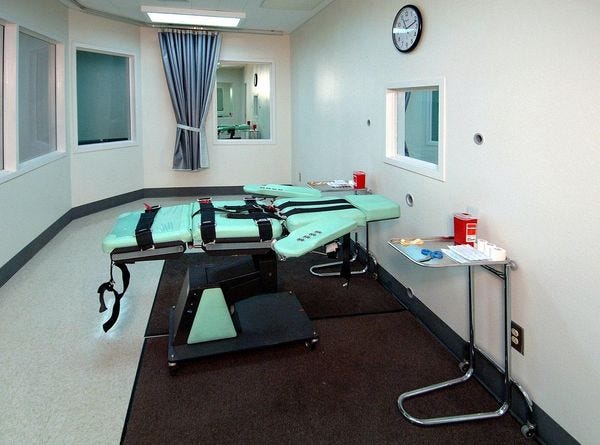Arizona To Pause Executions To Figure Out Why It Keeps Botching Them
Pretty much the same reasons every other state keeps botching them.
In July of 2014, the state of Arizona executed Joseph Wood. It was supposed to take 10 minutes for him to die. It took two hours, 15 injections and, according to an AP reporter who was present, 600 desperate gasps for air. While Republican Gov. Jan Brewer was certain Wood did not suffer and that the execution was basically fine, she did ask the Department of Corrections to conduct a review of the execution process.
For the next eight years, the state did not carry out any executions, due both to the review and the fact that they couldn't actually get any lethal injection drugs, as European and many US pharmaceutical companies refuse to provide them for executions. Eventually they found a compounding pharmacist to whip them up some poison and restarted executions in 2022. The first of these did not go well, as those in charge of setting the IV line took multiple tries to do so, resulting in a bloody and painful mess of an execution. Reporters were not allowed at any of the three executions that took place last year.
On Friday of last week, Arizona’s new Democratic Gov. Katie Hobbs issued an executive order announcing her intention to appoint an Independent Review Commissioner to look into the state's death penalty protocols in hopes of preventing any more of these botched executions. Specifically, the commissioner will look into the following areas:
1. The State’s procurement of lethal injection drugs, including but not limited to the source of the drugs, the cost to the State, and any considerations about the drugs such as composition and expiration;
2. The State’s procurement of gas chamber chemicals, including but not limited to the source of the chemicals, the cost to the State, and the composition of the chemicals;
3. ADCRR procedures and protocols for conducting an execution by gas chamber and by lethal injection, including but not limited to setting lines for a lethal injection, transparency and media access, access to legal counsel for the inmate, and contingency planning; and
4. Staffing considerations, including but not limited to training, staffing plans to conduct executions, and staff background and experience for administering an execution.
While Hobbs did not specifically call for a moratorium on the death penalty until this is figured out, Kris Mayes, the state’s new Democratic attorney general, has said she will not seek out execution warrants until the investigation is over.
Mayes also announced that she had filed a motion to withdraw her Republican predecessor's request for a warrant of execution for Aaron Brian Gunches. Gunches had previously requested to be killed by the state but had recently retracted that request on the grounds that the lethal injections as currently practiced were torture, which, you know, they are.
Hobbs should be commended for taking the issue of botched lethal executions seriously. It would of course be preferable to get rid of the practice entirely, but that is definitely not going to happen anytime soon, or ever, in Arizona.
Still — it's not as if we don't know how to kill people. We're very good at it here in America. The reason these executions are being botched is because state governments are committed to the fallacy that lethal injections are a humane way of executing people, as if there is a humane way to execute anyone, and they can't get the drugs necessary for those injections or people qualified to give them. They are comfortable with the idea of lethal injections because they think those executed in that way simply drift off to sleep, never to wake up again. This could not be further from the truth, even when the "ideal" drugs are available.
It seems important to note that there is no proof that the death penalty is a deterrent for crime. States that have the death penalty do not have lower crime rates or murder rates than states that do not. It is also extremely expensive, costing eight times more on average than a life sentence.
We know that we send innocent people to death row and that sometimes we successfully execute them. We know that many of the people we execute have developmental disabilities or severe mental illness.
At some point, states that have the death penalty are going to have to be honest with themselves about why they have it in the first place. It's not just. It’s not a deterrent. It’s not cheaper. It’s literally just because people like it and it makes them happy.
Do your Amazon shopping through this link, because reasons .
Wonkette is independent and fully funded by readers like you. Click below to tip us!




Thanks, I had thought I heard their last execution was 1937, turns out to have been 1977. Chapeau!
Good on 'em.